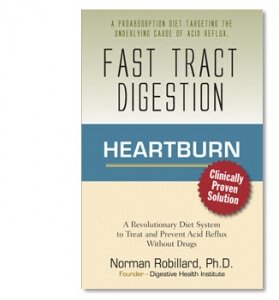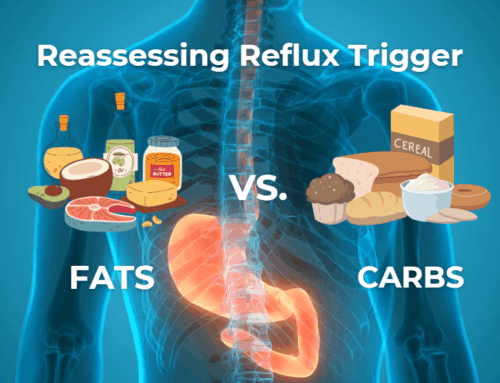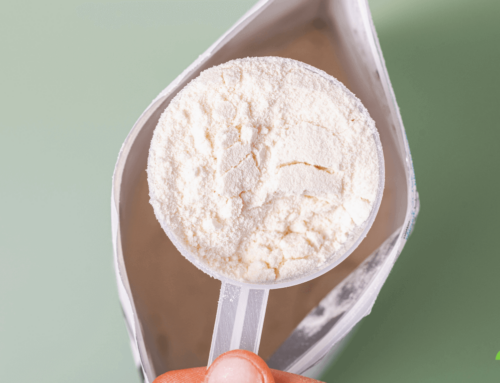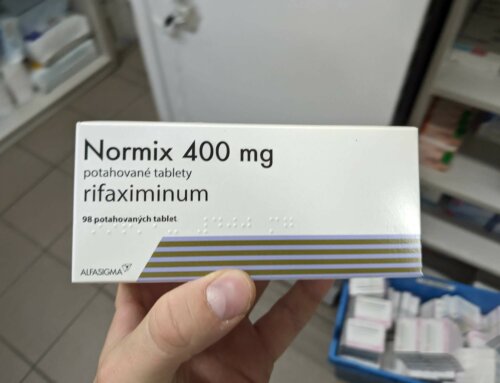Acid reflux is one of the subjects that I am passionate about and my answer went beyond the usual scope of the Fast Tract Diet Q&A.
Question about drugs for acid reflux
“I am wondering why so many doctors are quick to prescribe drugs like proton pump inhibitors and H2 blockers, often both together for acid reflux and LPR. I am worried about possible side effects from these medicines, especially if I need to be on them for a long time.”
My Answer
Here are some of the reasons I think many doctors overprescribe PPIs and H2 blockers for acid reflux and LPR:
- They are unclear on what really causes acid reflux and LPR (laryngopharangeal reflux).
- Both the medical literature and pharmaceutical marketing material promote these drugs as a complete solution.
- It’s easy and many people just want to take a pill and go back to their busy lives.
Since acid reflux and LPR both involve stomach acid getting into the esophagus (and beyond), blocking stomach acid makes sense to doctors. But like yourself, progressive doctors are beginning to realize that this solution has serious flaws:
- These medicines fail to address the underlying cause, small intestinal bacterial overgrowth and intestinal gas, which I have proposed along with the evidence in the Fast Tract Digestion Heartburn book.
- 50% of patients prescribed these drugs continue to have symptoms, leading to mega doses, combination therapy and costly follow-up testing.
- Serious health risks associated with acid reducing drugs include:
– Reduced vitamin B12 absorption (risk of anemia), vitamin C (growth and repair of tissues throughout the body, including wound healing), folic acid (growth and repair) and likely other vitamins.
– Reduced mineral absorption including calcium (risk of bone fractures), magnesium (risk of serious cardiovascular, neurological problems and also bone health), iron (risk of anemia), and zinc (nerve damage and digestive tract issues).
– Increased risk of bacterial overgrowth in the small intestine and stomach since stomach acid is part of our bacterial control system.
– Increased risk of C diff and other GI infections because our acid barrier to outside pathogens is missing and our protective gut microbiota are altered.
– Increased risk of kidney disease.
– Increased risk of pneumonia likely from reflux of gut microbes into the lungs. Stomach acid protects against reflux of viable bacteria from our gut to our lungs.
The challenge for getting doctors to take another look at dietary control of acid reflux received a recent setback when the American Medical Association’s Continuing Medical Education (CME) program for doctors and gastroenterologists published a report that they no longer support any type of dietary intervention for treating GERD, stating: “Routine global elimination of food that can trigger reflux is not recommended in the treatment of GERD.”
Unfortunately, the report ignores new research that I cover in my book indicating that fermentable carbohydrates are driving acid reflux, and limiting these in your diet can eliminate or dramatically reduce your acid reflux and LPR symptoms. The approach also covers pro-absorption behaviors and identifying and addressing other underlying causes that are specific to individuals, in other words a functional medicine approach. The benefits of the Fast Tract Diet include:
- Addressing the underlying cause(s) of acid reflux and LPR
- A healthy approach that rates hundreds of foods using a point system (Fermentation Potential – FP) that essentially measures symptom potential of each food
- Avoiding the numerous side effects and health risks associated with PPIs and H2 blockers
For more information, you can read my four-part article What Really Causes Acid Reflux and GERD as well as this great blog post by Dr. Mike Eades titled GERD Treatment: Nutrition vs Drugs.
To get started with the Fast Tract Diet, refer to the Fast Tract Digestion books. The Fast Tract Diet App is also available on Google Play and iTunes.
For questions, support and discussion, join the community of Fast Tract Dieters on Facebook.









Hello Norm,
My spouse has just been diagnosed with the beginning stages of pulmonary fibrosis and possibly pulmonary hypertension. He has been on PPI’s for approximately 2 years. He needs to lose 30 lbs and LES surgery is recommended. Heartburn is not a side effect of his GERD but IBS is. The international Lung Disease specialist at U of C suspects sleep apnea further relaxes the LES contributing to the acid reflux and that he has had IBS and sleep apnea undiagnosed for decades. Do you recommend the fast track diet for this scenario and what probiotics and probiotic brands would you recommend? I’m assuming if the probiotics and diet are working, his IBS will improve and this is hw he’ll know to discontinue the PPI’s?
Thanks
Hi Denise, Based on what you have told me, both silent reflux and IBS symptoms are present. The Fast Tract Diet is recommended. In this case the Heartburn volume might be the most appropriate. The book discusses probiotics as well.
Hello Dr.Norm,
I have severe GERD and LPR for 2 years and thinking silent symtoms(frequent sore throat, voice problems, mucus) were from my childhood (I am 42). During these 2 years of suffering from morning till night(constant chest pain radiating to the arms, sore throat and burning mouth) I was trying many thing – PPI’s at mega doses 2×40 mg Nexium and ultra low carb dieting without PPI’s for 3 mnths(carb – app 50 g per day-sources being non startchy vegies only, no diary, no nuts). No slightest relieve for both methods. Otherwise I am healthy, do not feel gut problems like constipation or exessive gas, jus some unpleasant tension in the gut under left rib. I am always underweight, BMI 18.
My endosc. showing healthy stomach and duodenum, but many “liquid” with bile. Erosions A in esoph. and non closing cardia. small HH. I choose to be operated and my NFundo was 3 mnts ago. Recovery was normal, but unfortunatelly I have the same symptoms again, even worse – I started to have “silent” regurgitation into my throat and more pain here especially on left side… 3 mnths folow up endo results good – no HH, cardia closed, no erosions. Bile still sitting in stomach. Barium swalow also showed healthy person functions…
I am frustrated now, that nothing can help me and I suffer again. The only time I feel better is eating and sleeping time…
Modesta
I am taking no PPI’s now. Taking soil based probiotics from Criss Kreseer as lactobased giving me some gas. During these 2 years I was taking probiotics regurlarly, also digestive enzymes, DGL, herbals to relieve gastrointestinal muscle tension.
Sorry for grammar, I am from far East Europe:)
Modesta
I’m new to this Forum but certainly not new to Acid Reflux.. Wanted to share this to all Acid reflux sufferers to tell you how I got off PPI with only Mild Rebound. Its free and valuable advice cos I believe in spreading good news and helping people.
I have been diagnosed with Acid reflux over a year Now.. Had Barium Swallow and Endoscopy and several tests.. I started with Ranitidine , Tecta and ended with Pantoprazole 40 mg daily which worked well . However, having heard about the serious side effects of long term PPI, I set out to taper off the PPI .
Upon my MD advice,this is what i did.
1.Took one tablet every other day for two weeks
2. Took one tablet every other 2 days for another 2 weeks
3. Took 1/2 tablet every other 2 days another 2 weeks
4. Stop PPi
5. Now used 150 mg Zantac, Tums when needed
I believe that Im doing well because its been over 2 months since tapering
What I found to be good is eating a piece of raw ginger for reflux symptoms
So far im doing well, hardly any symptons, except when I eat Spicy or stewed food.
Although , I have no proof of me being Celiac, what helped me most is diet control and switching to gluten free food.
I Thank God for this plan cos It worked.
Hoping that this will help someone
Has anybody tried a herbal antimicrobial protocol like the one recommended by Dr. Michael Ruscio or a lot of other Functional Medicine docs? Seems there are some good studies supporting this approach. I would love to hear Mr Robillard’s opinion on this topic.
Hi Erik,
You may want to listen to Dr. Norm’s podcast interview with Dr. Carri on his position regarding herbal antibiotics: https://www.drcarri.com/cure-for-acid-reflux/. Enjoy!
I have a Windows-7 desktop PC with a mouse.
Today I installed the Amazon Kindle App in order to view the Heartburn Fast Tract Digestion e-book which I just purchased for $9.99.
I totally dislike using the Kindle viewer with a mouse, it doesn’t scroll good, and the pages look awkward.
Do you sell the e-book that can be used with Adobe Reader as a .pdf file, or a Zip file? If so, I will buy it.
Hi Ralph,
We do not have a .pfd / zip file version for our e-books. But you may want to look into other free e-readers for better user experience. Also, if you are ready to start the diet, the Fast Tract Diet mobile app (https://www.fasttractdiet.com/) will help you look up over 800 foods, track your daily FP and symptoms, chart your progress, create custom recipes and shopping lists, etc. Be well.
I went in for an upper endoscopy in Jan since I was having trouble swallowing food. They found out I had a ringed esophagus and put me on Omeprazole 20mg ED for the rest of my life due to it anti inflammatory properties and seems to cure my issue. My issue is due to an allergic reaction of something I am eating and taking the pill is easier than an elimination diet. Well I went back in for my check up and they found I have a scalloped Duodenum and check for Celiac Disease.. Should I be concerned taking the Omeprazole ED and what may be my options and reason for the scalloped Duodenum.
Thanks joe
Hello Dr. Norm and Friends,
For the last 15 years I have been feeling acid in my mouth, sore throat, difficult breathing when doing heavy exercise, nose congestion, stomach pain, chest and back pain.
The Barium contrast X ray from 2009 showed a spontaneous stomach acid reflux due to the stomach hiatus hernia.
IN 2015 an upper endoscopy shows:
A small hiatus hernia was found found the proximal extent of the gastric Folds. Samples were taken to evaluate Barrets and celiac disease. All histology came back negative.
For more than 10 years, more than 10 doctors prescribed to me PPI,s. Still today after, this endoscopy I got another PPI prescription.
Two year a go I started to have tendinitis on both arms (lateral ephicondilitis) what made me stop weight lifting.
A year ago I started to feel chronic physical fatigue and mental fog and I lost 35 Lbs of mainly muscle. H. Pylori was detected in the stool tests. After 3 courses of prescribed antibiotics, one of them tetracycline) destroyed my gut flora, cause me a C Diff infection and many other colon complications. After getting the C Diff treated with another antibiotic (Vancomycin 250 mg) I was able to get on my feet again. The H pylori was tested and wiped out, the win losses ratio was not positive for my health. Thank you Dr. van Pala.
I’ve been in a Keto/Paleo diet for the last 10 months, what regain me some balance, with supplementation on D3, fish oil, vit C, Magnesium, and probiotic. The primal Defense probiotic was not the best result achiever in this class of probiotics. My symptoms improved dramatically, but still with heartburn and at 1/4 of my potential.
I read the book heartburn and fast track diet from Dr. Norman, which I think it is absolutely amazing, a true piece of science and clinical research.
Now, the diet plan itself, turns me off, because I´m coming from a whole, organics food diet, where I was able to pin point most of the allergy foods, and I’ve reservations about eating foods that are in a lower quality rank than what I’m eating now, at least in my perspective.
Hello Norm
I have silent reflux and my main symptom is my lungs having gas vapors flowing into them, this produces an on going cough and makes it hard to breath. I bought your book and am waiting for it. In the mean time, I am only eating meat and green veggies, I was expecting this breathing problem to fade, but it has not. Too Soon? It has been a couple of days.I am anxious about this because the next step would be surgery.. Thank you for any comments.
Sue
Yes, too soon Sue. Read the book and join the FTD Official Facebook group. I have been in your shoes.
Yes, too soon Sue. LPR symptoms will take some time to resolve. You can connect with other LPR folks with their stories and progress by joining the Fast Tract Diet Official Facebook group.